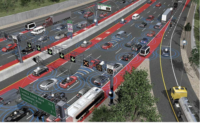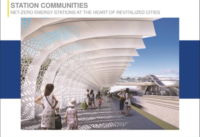Gearing Los Angeles up for the anticipated 2028 summer Olympics will require smart-city technologies as well as the completion of billions of dollars of infrastructure construction—during and after the current COVID-19 pandemic.
“At the end of the day, we still have projects to build and Los Angeles still has a deadline for the 2028 Olympics,” says Mark von Leffern, director of project controls for Hill International. Von Leffern is one of the organizers of the Western Winter Workshop, supported by the California chapters of AACE International and by the Construction Management Association of America, held recently in Indian Wells, Calif. “The coronavirus has no doubt impacted the way we all work and interact with each other, but there may be a bright light at the end of the tunnel with companies to embrace triple-bottom line goals and outcomes in being more environmentally sustainable, socially sustainable, and financially responsible.”
For ENR’s latest coverage of the impacts of the COVID-19 pandemic, click here
With virus-related decreasing ridership on LA Metro’s system, the agency is focusing on boosting any alternatives to single-vehicle occupancy, said Joshua Schank, its chief innovation officer. The voter-approved tax increases that have fueled billions for agency projects “are not just for transit infrastructure, but to get people away from driving alone,” he said.
Projects include a mobility-on-demand service at three train stations in partnership with Via, which has in one year generated about 80,000 rides, he said.
LA Metro has also forged a project development agreement for the Sepulveda Transit Corridor to involve the private sector in the environmental impact statement process. Two firms will then assist in corridor design, with one ultimately winning the design contract, Schank said.
In remarks that predated the COVID-19 pandemic, Genevieve Giuliano, director of the National Center for Metropolitan Transportation Research, noted that asking Los Angeles residents to work from home or have virtual meetings could help alleviate traffic during the Games. Similar strategies—asking employers to let staff remotely, take time off or have flexible work hours—accomplished that during the 1984 Games in the city, she said.
For its role in the Olympics, the city of Long Beach is working on an $85-million rehabilitation of Belmont Pier and a $92-million upgrade to its airport, said John Keisler, its economic development director.
Along with creating Olympic "villages" the city is also heavily investing in high-tech underground infrastructure, including a 5G hub in partnership with Verizon, he said.





Post a comment to this article
Report Abusive Comment